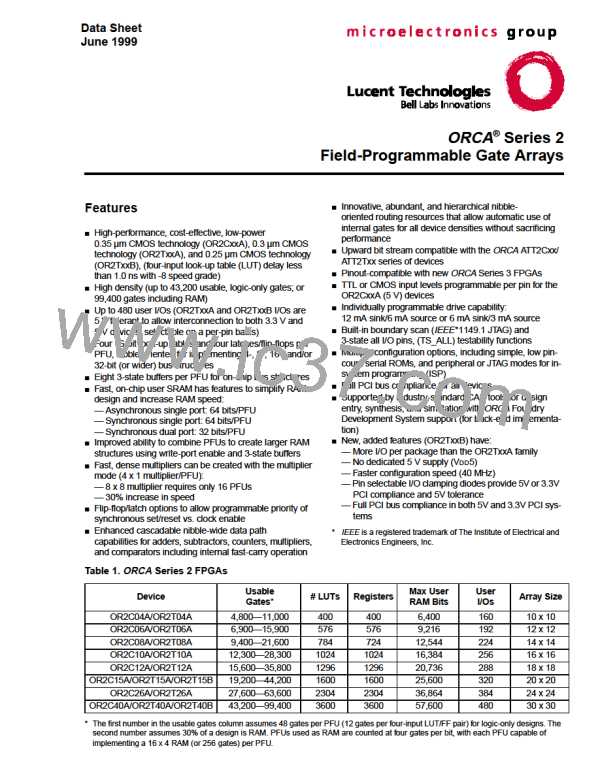Data Sheet
June 1999
ORCA Series 2 FPGAs
Timing Characteristics (continued)
Table 43B. OR2TxxB Global Clock to Output Delay (Pin-to-Pin)—Output on Same Side of the Device as the
Clock Pin
OR2TxxB Commercial: VDD = 3.0 V to 3.6 V, 0 °C ≤ TA ≤ 70 °C;
Industrial: VDD = 3.0 V to 3.6 V, –40 °C ≤ TA ≤ +85 °C; CL= 50 pF.
Speed
Description
(TJ = 85 °C, VDD = min)
Device
-7
-8
Unit
Min
Max
Min
Max
CLK Input Pin → OUTPUT Pin
(Fast)
OR2T15B
OR2T40B
—
—
7.3
7.5
—
—
6.6
6.6
ns
ns
CLK Input Pin → OUTPUT Pin
(Slewlim)
OR2T15B
OR2T40B
—
—
8.2
8.4
—
—
7.4
7.6
ns
ns
CLK Input Pin → OUTPUT Pin
(Sinklim)
OR2T15B
OR2T40B
—
—
12.9
13.1
—
—
12.1
12.3
ns
ns
Notes:
The pin-to-pin timing information from ORCA Foundry version 9.2 and later is more accurate than this table. For earlier versions of ORCA Foundry,
the pin-to-pin timing parameters in this table should be used instead of results reported byORCA Foundry.
This clock delay is for a fully routed clock tree that uses the primary clock network. It includes both the input buffer delay,the clock routing to the
PFU CLK input, the clock→Q of the FF, and the delay through the output buffer. The delay will be reduced if any of the clock branches are not
used. The given timing requires that the input clock pin be located at one of the four center PICs on any side of the device and that the direct
FF→I/O routing be used.
If the clock pin is not located at one of the four center PICs, this delay must be increased by up to the following amounts:
OR2T15B = 5.7%, OR2T40B = 12.5%.
D
Q
OUTPUT (50 pF LOAD)
CLK
5-4846(F)
Figure 62. Global Clock to Output Delay
Lucent Technologies Inc.
151

 ETC [ ETC ]
ETC [ ETC ]